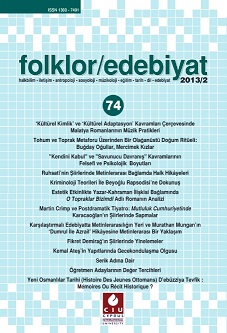Tohum Ve Toprak Metaforu Üzerinden Bir Olağanüstü Doğum Ritüeli: Buğday Oğullar, Mercimek Kizlar
An Extraordinary Birth Ritual by Using the Seed and Soil Metaphor: Wheat Boys, Lentil Girls
Author(s): Meral SalmanSubject(s): Cultural history, Customs / Folklore, Sociology of Culture, 15th Century, Sociology of Religion
Published by: Uluslararası Kıbrıs Üniversitesi
Keywords: Procreation; paternity; seed and soil; ritual; Alevi-Bektaşi;
Summary/Abstract: This article aims at exploring procreation belief among the Alevi-Bektaşi people who are affiliated with the Ulusoy family, with the so called descendants of the founder of the Bektaşi order, Hacı Bektaş Veli by focusing on a ritual about swallowing miraculous stone grains of wheat and lentil in order to get pregnant and have a baby. In this ritual, an analogy is drawn between seed and sperm and, between soil and womb. By using seed and soil metaphor, in procreation creative power is ascribed to male and nurturing role is ascribed to female. Parallel to this metaphor, according to the monogenetic procreation claim, pre-child is already included within sperm. In the same vein, the monotheist belief claims that it is God who creates the universe, world and human being. Both monogenetic claim and monotheist belief depend on the same principle of procreation which comes from one source. Therefore, based on a symbolic connection between God and male in terms of their ability to create, maleness is defined with paternity. This kind of paternity is the constitutive part of the patriarchy, the institutionalized system of the male dominance. Despite the fact that in the Alevi-Bektaşi belief all creatures are accepted as manifestation of God and, there is no absolute distinction between the Creator and created, the masculine principle of the universe is defined as reason which is at the same time progenitor and active. Thus, again, masculinity is defined as the generative force of the universe. In Vilayet-name, a hagiography on Hacı Bektaş Veli probably written in the 15th century, there are two extraordinary birth narratives which include metaphors of blood, seed and soil. These narratives reveal the same monogenetic and monotheistic role of males and females in procreation, besides that, gives information about paternity and, patrilineal kin relations. The blood metaphor connects Hacı Bektaş Veli with the Çelebis (the Ulusoys) and denotes kinship at human level and divine level. The narrative on and the ritual of swallowing stone grains of wheat and lentil draws a seed and sperm analogy and designates divine generative power of Hacı Bektaş Veli. The ritual necessitates sexual intercourse of the couples, thus, Hacı Bektaş becomes the divine father of the babies. The ritual is ended after “biological” fathers of the newborn babies sacrifice an animal in order to pay homage to the divine creative power of Hacı Bektaş. Thus, the article examines how paternity is constructed at the levels of divine and human and how these levels are connected each other by different metaphors on kinship in the narratives and rituals about Hacı Bektaş Veli.
Journal: Folklor/Edebiyat
- Issue Year: 19/2013
- Issue No: 74
- Page Range: 47-59
- Page Count: 13
- Language: Turkish

